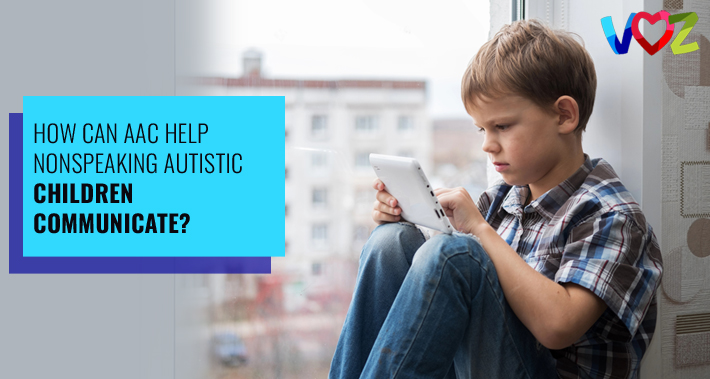
Speaking is how most people communicate.
It lets us interact with others and get our needs met.
However, not everyone is able to speak.
This includes nonspeaking autistic children.
Nonspeaking autism is a form of autism where children are unable to speak in some or all situations.
But that isn’t because they have nothing to say.
Every child deserves a way to communicate.
Not being able to speak shouldn’t take that right away.
Alternative and augmentative communication (AAC) is a crucial tool for helping nonspeaking autistic children to communicate.
Here at our speech therapy clinic, we have a number of different SLPs with a variety of therapeutic specialties, including speech therapy for nonspeaking autistic kids
Let’s take a look at how AAC can help nonspeaking autistic children.
RECAP: What Is Nonspeaking Autism?
Nonspeaking autism is a term used to describe some autistic children.
These children are not able to speak, in some or all situations.
They’re usually able to understand spoken language, though.
And of course, they have many thoughts to share.
But they can’t express them through speech.
Of course, there are more ways to communicate than just through speech.
That includes AAC.
Will AAC Stop Your Child From Learning To Speak?
Many parents worry that AAC will prevent speech development.
They fear their child will rely on AAC and not learn to talk.
However, research shows this is not the case.
Studies have found that AAC does not hinder speech in autistic children.
In fact, the opposite is true.
In some cases, nonspeaking autistic children will learn to speak.
If so, they’re more likely to do so if they have access to some way to communicate.
On the other hand, some nonspeaking autistic kids will never learn to speak.
In those cases, AAC can provide them a way to access the richness of interpersonal communication.
AAC empowers your nonspeaking child, giving them a way to communicate their thoughts and needs, even if they can’t do so through spoken word.
This shows them the power of communication.
The most important thing is giving your child a voice.
They deserve to be heard, whether through AAC, speech, or both.
When Should You Seek AAC For Your Nonspeaking Autistic Child?
You may wonder if your child is ready for AAC.
Some people think specific skills are needed before trying AAC.
This is a myth.
Your child does not need to have any prerequisites to start AAC.
They can learn skills like pushing buttons while using AAC.
AAC may help them gain these skills faster.
When your child sees the benefits of AAC, they’re motivated to learn.
They realize that using AAC meets their needs.
This encourages them to keep developing their AAC skills.
So, when should you seek AAC for your nonspeaking child?
As soon as possible.
Giving them access to communication is always a good idea.
Seek an evaluation from a speech therapist for a better understanding of what your next steps will be.
Your child deserves a way to communicate, regardless of their current abilities.
How Should You Choose An AAC Option?
There are many types of AAC options and devices to consider for your child.
Low-tech options include gestures, sign language, and picture boards.
These don’t require any special equipment.
Mid-tech options include devices with a limited number of messages.
These devices play recorded messages when a button is pushed.
High-tech options include touchscreen devices and tablet apps with many features.
These can be customized and grow with your child’s skills.
With so many options, you may feel overwhelmed.
That’s where a speech therapist can help.
They will consider your child’s unique needs and abilities.
They can recommend the best type of AAC for your child.
Trust their expertise, but also trust your instincts.
You know your child best.
Choose an AAC option that feels right for your family.

How Do Nonspeaking Autistic Kids Learn To Use AAC?
Learning to use AAC is a process.
It takes time, patience, and practice.
But with the proper support, your child can become an effective AAC user.
Here are the steps to help your nonspeaking child learn AAC:
1. They Have It Demonstrated To Them
The first step is to show your child how AAC works.
Model using the AAC system yourself.
If it’s pictures, point to the pictures while you talk.
If it’s a device, push the buttons as you speak.
This helps your child understand how the AAC system conveys meaning.
2. They Get A Chance To Try It Themselves
Once your child has seen their new AAC modelled, let them try.
Give them access to the AAC system.
Encourage them to explore and use it in their own way.
This hands on experience is vital to learning.
3. They Get A Lot Of Support From You At First
When your child first starts using AAC, they’ll need extra help.
Guide their hand to form signs, point to pictures, or push device buttons.
Immediately reward them as if they’ve spoken the word.
If they seem frustrated, back off and try again later.
4. They Slowly Learn New Words
Start with just a few words on the AAC system.
Once your child masters those, slowly add more.
Model the new words frequently before expecting your child to use them.
Gradually reduce your prompting as your child gains independence.
Learning AAC takes work, but it’s so worth it.
Seeing your child communicate is an incredible feeling.
Celebrate every step along the way.
Book Your Appointment With The Voz Institute Today
AAC gives nonspeaking autistic children a powerful tool.
It allows them to communicate their thoughts, needs, and desires.
If you have a nonspeaking autistic child, it’s a good idea to consider AAC.
It can open up a whole new world for your child.
Your child deserves a voice.
AAC can provide that voice.
Here at The Voz Institute, we can help.
Book your appointment with The Voz Institute today.
1100 H St NW Ste 940,
Washington, DC 20005
(202) 734-4884
- https://g.page/vozspeechtherapy
The Voz Institute is a pediatric bilingual speech therapy clinic in Washington, DC that provides individualized services based on the specific needs of your or your child. Therapy sessions are provided in English or Spanish, depending on your child’s native language.
1100 H St NW Ste 940,
Washington, DC 20005
(202) 734-4884
- https://g.page/vozspeechtherapy
El Instituto Voz es una clínica pediátrica bilingüe de terapia del habla en Washington, DC que brinda servicios individualizados según las necesidades específicas de usted o su hijo. Las sesiones de terapia se brindan en inglés o español, según el idioma nativo de su hijo.